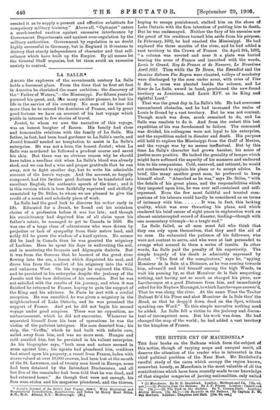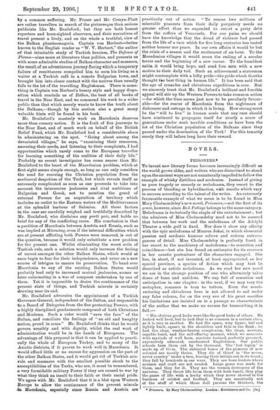THE BITTER CRY OF MACEDONIA.*
THE four books on the Balkans which form the subject of this notice, though of varying scope and unequal merit, all deserve the attention of the reader who is interested in the chief political problem of the Near East. Mr. Brailsford's careful study of the races which occupy the region known, somewhat loosely, as Macedonia is the most valuable of all the contributions which have been recently made to our knowledge of that singular congeries of jarring nationalities, only united * (1) Macedonia. By H. N. Brailaford. London : Methuen and Co. 112s. 65. net.]—(2) .Pictures front the Balkans. By .7. F. Fraser. London : Cassell and Co. [6s. J—(3) The Turk in the Balkans. By T. Comyn-Platt. London: Alston Rivers. De. 6d.1—(4) By-paths in the Balkans. By Captain F. We TM Herbert. London : Chapman and Hall. [10e. 64. net.] by a common suffering. Mr. Fraser and Mr. Comyn-Platt are rather travellers in search of the picturesque than serious publicists like Mr. Brailsford; but they are both honest reporters and keen-sighted observers, and their narratives of travel present a lively, and on the whole a truthful, view of the Balkan phantasmagoria. Captain von Herbert—better known to the English reader as "W. V. Herbert," the author of that inimitable study of Turkish heroism, The Defence of _Plerona—aims more at literature than politics, and presents us -with some admirable studies of Balkan character and manners, the result of an adventurous journey during which a temporary failure of remittances compelled him to earn his living as a waiter at a Turkish café in a remote Bulgarian town, and brought him into closer contact with the natives than usually falls to the lot of the travelling Englishman. There is some- thing in Captain von Herbert's breezy style and happy dispo- sition which reminds us of Eothen, the best of all books of travel in the Near East, and we commend his work to a wider public than that which merely wants to know the truth about the Balkans,—though by this section also a great many valuable hints will be found in his book.
Mr. Brailsford's masterly work on Macedonia deserves 'more than cursory notice. It is the fruit of five journeys to the Near East, and of much work on behalf of the British Relief Fund, which Mr. Brailsford had a considerable share in administering on the spot. "Going about among the devastated villages," be says, "examining their resources, assessing their needs, and listening to their complaints, I bad opportunities which rarely come to the European traveller for learning something of the realities of their daily life." Probably no recent investigator has come nearer than Mr. Brailsford to the heart of the Macedonian problem, which at first sight seems simple enough, so long as one only considers the need for rescuing the Christian population from the inediaeval despotism of the Turk, but which reveals itself as extremely complicated as soon as one proceeds to take into account the internecine jealousies and rival ambitions of Bulgarian and Greek, not to mention the greed of external Powers for an acquisition of territory which includes an outlet to the Eastern waters of the Mediterranean at the splendid harbour of Salonica.. All these factors in the case are carefully weighed and truthfully described by Mr. Brailsford, who disclaims any parti pris, and holds no brief for any of the conflicting races. His conclusion is that a partition of Macedonia between Austria and Russia, such as was implied at Miirzsteg, even if the internal difficulties which are at present afflicting both Powers were removed, is out of the question, because it would only substitute a new problem for the present one. Whilst eliminating the worst evils of 'Turkish rule, such a solution would only increase the feeling of unrest amongst the other Balkan States, which would at once begin to fear for their independence, and enter on a new course of intrigue to ensure its preservation. To hand over Macedonia to any of the existing Balkan States would probably lead only to increased mutual jealousies, sooner or later culminating in a war of conquest undertaken by one of them. Yet it is impossible to desire the continuance of the present state of things, and Turkish misrule is certainly drawing near its end.
Mr. Brailsford advocates the appointment of a Turkish Governor-General, independent of the Sultan, and responsible to a Board of Delegates from the five protecting Powers, with a highly disciplined gendarmerie composed of both Christians and Moslems. Such a ruler would "save the face" of the Sultan, and conciliate the feelings of "an old and haughty -nation, proud in arms." Mr. Brailsford thinks that he would govern sensibly and with dignity, whilst the real work of administration would be in the bands of Europeans. The advantage of this proposal is that it can be applied to practi- cally the whole of European Turkey, and to many of the Asiatic districts, if it proves to work well in Macedonia. It -would afford little or no excuse for aggression on the part of the other Balkan States, and it would get rid of Turkish mis- rule and massacre with the smallest possible shock to the susceptibilities of the Turks, who are, it must be remembered, a very formidable military Power if they are roused to war by what they think an insult to their faith or their racial pride. We agree with Mr. Brailsford that it is a blot upon Western _Europe to allow the continuance of the present misrule in Macedonia, especially since Russia and Austria are
practically out of action. "To rescue two millions of miserable peasants from their daily purgatory needs no greater effort than we expended to extort a petty debt from the coffers of Venezuela. For our pains we should have the knowledge that the dread of violence bad passed from the life of a race which for five long centuries has tasted neither honour nor peace. In our own affairs it would be but the crisis of a season and the excitement of an hour. To the Macedonian villages it would mean the ending of a secular terror and the beginning of a new career. To the humblest cabin it would bring hope, and send free men with a new motive to their daily toiL Such an achievement a statesman might contemplate with a lofty pride—the pride which Goethe thought tke best thing in human life." It has been said that the age of crusades and chivalrous expeditions is over. But we sincerely trust that Mr. Brailsford's brilliant and forcible appeal will stir up the Western Powers to take common action —for which the time seems just now to be peculiarly favour- able—for the rescue of Macedonia from the nightmare of dishonour and outrage in which it is living. How strong must be the "will to live" in human souls that any race should have continued to propagate itself for nearly a score of generations under such terrible conditions as have been the lot of the Christian population of the Balkans since they passed under the domination of the Turk ! For this tenacity surely they will before long have their reward.











































 Previous page
Previous page